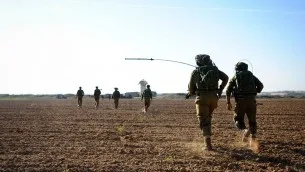While soldiers stationed near the north of the Strip face rocket fire and other attacks, in the south, Hamas keeps a lid on Salafists and prepares for next round of fighting.
Times of Israel reports that while the northern portion of the Gaza Strip has seen intermittent rocket launches, regular violent demonstrations and, most recently, an attempted bombing attack against Israeli troops, the southern end of the coastal enclave has been quiet — deceptively quiet, a senior IDF official said recently.
In the southern Gaza Strip and across the
border in Egypt lie two different but looming threats: Palestinian
terror and the Islamic State.
Neither Hamas nor the Islamic State want to go
to war with the IDF today, according to army estimates, but that is the
direction both are heading for the future, the officer said.
The threat from Islamic State is not imminent —
it’s not going to necessarily happen “tomorrow or next year,” the
officer said — but the army believes that the terrorist groups will
eventually move against Israel, if Egypt does not succeed in defeating
them first.
In Gaza, the situation is more complicated. It
is easy to consider the Gaza Strip as one unified body ruled by Hamas,
but within the 365 square kilometers (141 sq. mi.) region, there are a
variety of groups, each with its own aim and plans to achieve it.
Though Hamas may want to wait until it is
adequately prepared before taking on the IDF, the more radical and often
Iran-supported Salafist groups are chomping at the bit to renew
hostilities with Israel.
Nearly every attack against Israel by these
groups, however, results in an IDF counterstrike against Hamas, which
Israel holds responsible for any violence emanating from the coastal
enclave. Hamas, a sworn enemy of the Jewish state, is therefore left
with the unusual task of preventing those groups from carrying out
attacks against Israel.
Breaking up the boredom
In the northern and central Gaza Strip, across
the border from Israel’s Sha’ar Hanegev communities, Palestinian terror
groups run wild, firing rockets and planting IEDs along the border
fence, as Israel saw on Wednesday morning.
But in the south, Hamas commanders maintain
better discipline over the more extreme Salafist groups, keeping such
attacks to a minimum.
That discipline in the south translates into
fewer small-scale skirmishes with the IDF and fewer rockets launched
against the Israeli communities nearby, notably Sufa and Holit, which
enjoy more quiet than their neighbors in Sha’ar Hanegev.
But it also means that there are more
preparations for future battles with the Jewish state, in the form of
intelligence gathering and tunnel construction, the officer said.
A senior Hamas member, Rahman al-Mubashar, was
killed late last month when a tunnel east of Khan Younis, in which he
was working, collapsed, the terror group announced last month. Given the
Palestinian city’s location near the frontier with Israel, the
statement could have been a reference to a tunnel nearing or in Israeli
territory.
The quiet in the southern end of Gaza is meant
to “distract us and lull us to sleep,” the officer said, to trick the
IDF into security lapses.
The soldiers serving at Israel’s westernmost
point face multiple threats from both Gaza and Egypt, sitting at the
meeting point of the three territories. But unlike their comrades
guarding the northern Gaza border and Israel’s borders with Lebanon and
Syria, who face regular threats, the troops stationed in southern Gaza
have little to naturally keep them alert.
The IDF believes that it is being watched and
being intentionally bored to distraction, forcing commanders in the
field to keep their soldiers on their toes with frequent exercises.
 |
| (Amit Shechter/IDF Spokesperson’s Unit/Flickr) |
“It’s all about defense, defense, defense,” he said.
This entails monitoring the border fence for
IEDs or evidence that someone crossed the border illegally, and also
working with intelligence and combat engineering to identify possible
attempts to tunnel into Israel.
While infiltration into Israel has become less
of a problem of late, the officer said, soldiers are still kept busy by
smuggling attempts along the Egyptian border, as well as African
migrants attempting to enter the country through the Sinai.
The smuggling itself “doesn’t really interest
us,” the officer said, though it does reveal the lapses in Israeli
security that could be exploited by terrorists.
The soldiers, some of whom served in Gaza
during last summer’s Operation Protective Edge, are also partially
responsible for the security of the Kerem Shalom Crossing, through which
hundreds of tractor trailers loaded with food and aid travel into Gaza
almost every day.
 |
| Goods and medical supplies being transferred to the Gaza Strip through the Kerem Shalom Crossing, 7/19/14 (IDF Spokesperson) |
The Defense Ministry handles the majority of the security at the crossing, inspecting trucks coming through for contraband
and guarding the complex itself while it is in operation. But the IDF,
as the group ultimately responsibility for the area, checks the complex
each morning before the trucks begin rolling through, the officer said.
In recent years, the crossing has been shot at
with guns and rocket fire, leading Israel to shut the border and
earning the Palestinians international sympathy over the lack of goods
flowing in, the officer said.
Besides the occasional small weapons fire, the
crossing, which sits near the Egyptian border, also came under serious
attack in August 2012, when a group of terrorists from Sinai rammed an
armored car through the border fence with Egypt, after attacking an
Egyptian army installation.
They made it approximately two kilometers
(1.25 miles) into Israel and toward Kerem Shalom before Israeli aircraft
destroyed the vehicle.
The officer says he won’t allow such an attack to happen again.
“If I think the road is under threat, I’ll just put a tank in that area so that they know they will be stopped,” he said.


Comments
Post a Comment
Your comment has been received. Thank you.